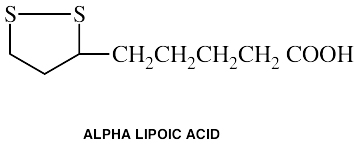March 3, 2008
Alpha-Lipoic Acid: Universal Antioxidant…And Miracle Cure?

By Michael D. Shaw
Ever since the pharmaceutical industry began advertising their products directly to the consumer, the outstanding benefits of dozens of drugs have been widely touted. Certainly, there are guidelines regarding how the benefits are presented, along with provisions to address the often scary list of side effects. At best, these pharmaceuticals—created at great cost, and not always tested as well as they should be—have a limited number of indications. That is, they have very specific applications.
Compare these to a naturally-occurring substance that has been proven effective in such disparate areas as treating…
- Peripheral neuropathy in diabetics; also reduces blood sugar levels
- Chronic hepatitis
- Alzheimer’s disease
- Certain oral dermatological conditions
We’re talking about alpha-lipoic acid, a powerful antioxidant, acting as a defense against harmful free radicals. A free radical is any atom or molecule that has an unpaired electron in the outer ring. As such, these entities are forever in search of that missing electron, and when they find one and strip it off from a neighbor molecule, they have just oxidized it.
Since this activity will set off a chain reaction of more free radicals being created, spawning yet more of the same, substantial biological damage can occur, including perhaps the aging process itself. Moreover, it is thought that the toxicity of heavy metals, ionizing radiation, various pesticides, and tobacco smoke may all be due to their free radical initiating ability. Some free radicals occur during metabolism, and occasionally free radicals are generated on purpose by our immune system to kill bacteria and viruses. For a variety of reasons, our system might not be able to cope with the free radical onslaught. Suffice to say that they have been implicated in dozens of diseases.
The role of antioxidants is simply to stop the free radical chain reaction. You’re no doubt acquainted with two of the most common antioxidants—Vitamins C and E.
Vitamin C is our body’s most abundant water-soluble antioxidant, noted for combating free-radical formation caused by pollution and tobacco smoke in the body. Vitamin E is our body’s most abundant fat-soluble antioxidant, noted for its action against lipid peroxidation (the formation of unstable molecules containing excess oxygen).
What makes alpha-lipoic acid so special is that it is both water and fat (lipid) soluble: the universal antioxidant. Thus, it is able to deactivate both fat and water soluble free radicals and thereby protect both lipoproteins and membranes. No other single antioxidant can do this. Additionally, alpha-lipoic acid can cross the blood/brain barrier—a wall of tiny vessels and structural cells—and pass easily into the brain.
Supplementation of alpha-lipoic acid will increase levels of glutathione, essential for proper functioning of the immune system, as it plays a crucial role in the multiplication of lymphocytes. Adding glutathione may even have an anti-aging effect, inasmuch as its levels decline with age, thus promoting more free radical damage.
Alpha-lipoic acid acts synergistically with the herb milk thistle (silymarin) and selenium in the treatment of Hepatitis C, and has shown promise with stroke—especially in animal studies. Research is ongoing in such areas as heart disease, as well as therapies for human immunodeficiency virus (HIV), cataracts, chronic fatigue syndrome, and glaucoma.
Side effects of alpha-lipoic acid appear to be minimal, but diabetics are cautioned that it may lower their blood sugar levels too much, and they should monitor this. There might also be interactions with other medications, including thyroid supplements. Patients are advised that certain anti-cancer drugs might be affected. With little pediatric clinical data available, it is not recommended for children.
Dietary sources of alpha-lipoic acid include spinach, liver, broccoli, beef, and brewer’s yeast. Commercial supplement capsules are readily available in dosages ranging from 30 to 100 milligrams. For general antioxidant support, many people take 20 mg to 50 mg per day. Therapeutic effects for peripheral neuropathy required dosages of 600 mg, divided through the day.
With the establishment of The National Center for Complementary and Alternative Medicine (NCCAM) in 1998, complementary and alternative healing practices are explored in the context of rigorous science. Happily, there have already been five clinical trials involving alpha-lipoic acid, and we anticipate excellent results.

